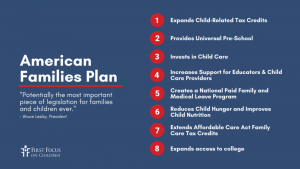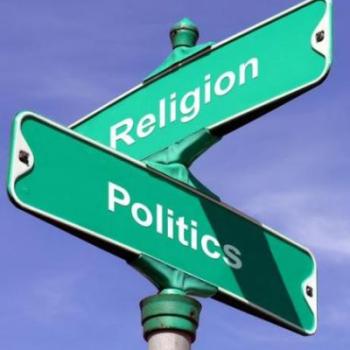Or could a proposal by a Republican writer be more liberal, more Catholic?
 President Joe Biden proposes an American Families Plan, which may or may not make it, with or without changes, past Republican opposition in Congress. The Catholic Biden diverges from his Church on some issues and is more Catholic than most Republicans on many others. These latter would include the many ways governments support, or could support, families.
President Joe Biden proposes an American Families Plan, which may or may not make it, with or without changes, past Republican opposition in Congress. The Catholic Biden diverges from his Church on some issues and is more Catholic than most Republicans on many others. These latter would include the many ways governments support, or could support, families.
The Catholic Church has always been supportive of families. For well over a hundred years that has meant the Church has involved herself in a non-sacred realm, the secular endeavor called politics. For as long, that is, as the Church has largely accepted the modern division of politics from religion – as long as the Church has (largely) been modern. (See my posts on Catholic Modern by James Chappel, especially this one, which presents Pope Pius XII’s views on state support for families.)
Family policy In the United States, for all the talk one hears of “family values,” is less supportive of families than the policies of practically any other successfully industrialized country. Into that context President Joe Biden introduces his “American Families Plan.” Conservatives react one way, liberals another. And then there’s the centrist Republican David Brooks, columnist for the New York Times. This post will look from a Catholic perspective at his response to the American Families Plan as well as that of a Democratic writer for the same paper.
Disclosure: On most issues, I stand on the liberal fringe of the Democratic Party. Nevertheless, I like what Brooks has to say. His piece is an interesting counter proposal. I’m wondering if it may be more liberal than any Democratic proposal. At any rate, it strikes me as being very Catholic.
First, Democrat Paul Krugman on the American Families Plan
Paul Krugman says, in his title, “Good luck to Republicans if Biden’s Family Plan becomes law.” He anticipates huge, benefits that millions of families will thank Democrats for. These include:
- Affordable childcare,
- Universal pre-K, and
- Paid leave for new parents, fathers or mothers or both
That’s on top of protecting health insurance from Republican attack and even advancing it with a public option or Medicare-type policies for all.
Republicans respond, says Krugman, by complaining about big government and resisting Biden’s plan to raise taxes on the wealthy, including his “dastardly plan to give the Internal Revenue Service enough resources to crack down on wealthy tax cheats.”
Krugman argues, successfully I think, with statistics from the Clinton and Obama years, against Republican claims that tax hikes kill jobs. The American Families Plan would create jobs, obviously in childcare but also for mothers or fathers who will be able to pay less for child care than they can earn at a job. It would “increase the number of Americans – women in particular – in paid employment substantially, probably by several million.”
Krugman also cites the experience of other countries like France and the Nordic countries. These high-tax countries prove that taxes don’t kill jobs. Lack of affordable childcare does. And, compared to other countries, “our government spends almost nothing on child care and pre-K; our outlays as a percentage of G.D.P. put us somewhat below Cyprus and Romania.”
The American Families Plan, limiting child care costs to 7 percent of income or less, would raise employment, Krugman estimates, by about:
- 8 million jobs if it raised employment of prime-age American women to French levels,
- 3 million jobs if to Danish levels.
He concludes: “If these plans improve life for millions of Americans, will anyone besides professional ideologues care if they’re “big government”?
Pushing back against Krugman
Higher employment for mothers – Krugman tries to be clear – isn’t the point of the American Families Plan. It’s about improving the environment for children. Jobs, more Americans paying taxes, and fewer Americans needing safety-net programs would be big “side benefits.” But jobs numbers, especially for women, aren’t just an aside in Krugman’s argument. They make up the largest part of his article.
Liberal that I am, I am not against expanding government for a good cause. I am, however, against expanding the economy for no economic reason whatsoever. The American Families Plan, Krugman’s article shows, would expand the economy. It would increase the number of childcare jobs and free up formerly stay-at-home parents for paid employment. And, “Jobs generally expand to meet the available work force,” Krugman says. Not in response to any actual need, I note, but just because the people are available.
Honoring many kinds of work
Joe Biden wants to create jobs for many worthwhile purposes—education, healthcare, and the fight against climate change. Making free education available past K to 12, which served well enough in the last century, is a good idea for the present century. Biden also wants to extend free education at the other end, below Kindergarten—a helpful option for some but probably not all. (See David Brooks’ argument below.) Raising healthcare outcomes to match what other countries achieve will require more nurses and family-care physicians. Fighting climate change and, as necessary, adapting to it will be a huge job creator when we finally get serious about it. Federal and local governments can play a useful, supporting role in addressing all of these needs.
Pumping government money into childcare probably will benefit children and families. But is there another, non-job creating, non-economy expanding, way to provide the same benefit? Having work and a regular paycheck is a great thing, but it’s far from the only way our lives are worthwhile. The unpaid work that parents do in maintaining a home and raising a family and, likewise, volunteer work outside home and family are at least as good at making life meaningful as paid labor. They provide at least as much dignity . Public policy doesn’t pay much honor to this obvious truth, but it could.
That’s the point of the next commentator, a Republican with a different idea about spending (lots of) government money.
David Brooks’ idea: Give power (and money) to the parents!
Are children with two parents better off if one parent stays home? David Brooks cites research that says most Americans answer, “Yes.” Interestingly, that affirmative is more pronounced among “the working class and to a lesser extend the middle class.” At higher income levels people tend to prefer the “dual earner” path. Brooks doesn’t weigh in on that issue. He thinks parents ought to be free to decide it for themselves. Government should not favor one or the other but should “help people build the kind of family they prefer” – and spend money doing that.
Brooks praises one part of Biden’s American Families Plan, expanding the child tax credit, or child allowance. Parents can use it to help pay for day care or to spend more time at home and less at work, or have more children than they can afford now.
Besides these goals Biden’s plan has two others, to which Brooks takes less kindly. First, the administration wants to get more people working. Brooks quotes Susan Rice, head of the Domestic Policy Council: “We want parents to be in the work force, especially mothers.” I’ve already said what I think about more people working just for the sake of working or expanding the economy. The second goal is getting more kids in classroom settings.
On not favoring rich people
If the goal is to advance kids’ learning, what about the working class parents’ preference for spending more time with their kids? Parents who help children develop social and emotional skills can be “a powerful tool to boost kids’ educational attainment,” Brooks says; and he quotes a former researcher of the liberal Brookings Institution. Grover J. Whitehurst says,
It turns out that putting money directly into the pockets of low-income parents, as many other countries do, produces substantially larger gains in children’s school achievement per dollar of expenditure than does a year of preschool or participation in Head Start.
Parents know the most about their own children and the quality of their particular childcare or schooling options. They can decide best for their children. To help parents do that, Brooks says, Biden should “focus money on direct subsidies and go big.” He quotes another scholar, W. Bradford Wilcox of the University of Virginia:
Because the Biden administration is trying to be all things to all people … it partially funds a number of initiatives, including the child allowance. I’d much rather see the administration cut out the money promised for pre-K and child care and fully fund a generous child allowance.
Brooks’ final thought aims directly at the liberal conscience. Childcare and preschool subsidies may be a political tool for the rich against the poor. It preferences “thriving meritocrats [who] may be eager to re-enjoy the satisfactions of full time work.” While these rich folks favor government support for childcare and preschool, “working-class families overwhelmingly support direct subsidies.” And “in one 2018 survey only 28 percent of married mothers said working full time was ideal. Forty percent said working part time was ideal.” Why should state power privilege the parenting preferences of the rich?
My response
I remember a time, long ago now, when nearly everyone believed a growing economy would solve society’s poverty problem. That thought almost erased the left-right divide in the economic thinking of the Catholic Church. To quote one of my posts on James Chappel’s Catholic Modern:
Despite the Catholic Church’s long rejection of materialism, it was a consumer society that brought opposing elements of the Church into a consensus in the “long 1950’s.”
(Chappel calls the period from 1949 to 1964 the “long 1950’s.”)
Catholic family values then included today’s negatives: opposition to divorce, abortion, homosexuality, and pornography. But they also included positives like a wage that could support a family and state support for the unemployed and underemployed.
It was the start of the age of the consumer, a challenge for Catholics who had always been and still were against materialism. So the Church’s anti-materialism acquired nuance. Quoting my post again:
They [Catholics] rejected a consumerist society built around the desires of the individual. That was hedonism. But material prosperity designed for the needs of the traditional family was well-ordered and moral. Thus there was a good kind of consumer.
The later saying “A rising tide lifts all boats” matched what people felt about a growing economy. It was an ideology to which everyone, including the Church paid much fealty. The Church had been ambivalent, if not suspicious, of capitalism. Now it began to emphasize its good points. But the ideology embodied in that “rising tide” saying was wrong. The economic tide rose, but it lifted only very ritzy boats. The “long [and consensual] 50’s” gave way to the controversy-ridden late 60’s and on.
Consensus building again?
If you don’t count most of the Republicans in Congress, there seems to be a growing sense that the minimum wage ought to go up, probably to $15/hour. More surprisingly, two Congressional Republicans have advanced family support policies that, in dollar amounts, rival Biden’s family tax credit/allowance. One of these plans the liberal Catholic magazine Commonweal prefers to Biden’s. That’s the proposal by Senator Mitt Romney. It’s simpler. Rather than going through complicated tax forms it uses the Social Security Administration, “which has decades of experience sending out monthly checks to large numbers of Americans.” Both Biden’s and Romney’s versions have gained the approval of conservative Catholic outlet National Catholic Register. Both plans, the Register says, “align with some of the Church’s social priorities” and “could help lift millions of children out of poverty, encourage marriage and family formation, and save children from abortion.”
Neither plan measures up to David Brooks’ idea of really “going big.” He’d probably want to see all of Biden’s childcare money added to the allowance for families with young children. Add to that the American Families Plan’s paid family leave, plus a serious attempt at making healthcare a right regardless of ability to pay and a family wage, which $15/hour still is not. That would bring U.S. family policy into line with what the Church has advocated for since the 1930’s. It’s also what centrist Christian Democratic administrations have, with Church approval, to some extent achieved in various European countries.
Addressing unacceptable levels of economic inequality
I remember economic inequality in my growing years, the 1950’s and 60’s. There were millionaires, and we were “thousandaires.” It wasn’t a big deal. But inequality has been rising meteorically for so long now and to levels so outrageous that it seems like the natural state of a capitalist economy. It’s hard to believe there was ever a time in this country when inequality was declining. That time was the four decades from the 1940’s to the 70’s. It was before Reganomics and what’s called “neo-liberalism” reached into the heart of both Republican and Democratic politics.
Thinking about inequality is three ways relevant today and to this post. First, it’s a sin and simply ridiculous how far from the average American, to say nothing of the poor, the very rich have separated themselves. And second, government can do something about it. Third, political leaders are actually talking about it. Here’s Boris Johnson at the G7:
I think what’s gone wrong with this pandemic, or what risks being a lasting scar, is that inequalities may be entrenched. And we need to make sure that, as we recover, we level up across our societies and we rebuild back better.
And here’s MacKenzie Scott, former wife of Amazon’s Jeff Bezos:
This pandemic has been a wrecking ball in the lives of Americans already struggling. Economic losses and health outcomes alike have been worse for women, for people of color, and for people living in poverty. Meanwhile, it has substantially increased the wealth of billionaires.
As an Amazon heiress, she includes herself on the list of the undeserving wealthy and is doing her best to liquidate her billions through charitable giving.
Or building back, but not better
I hear the common objection to the idea of giving people money just because they need it. People complained that the first Covid unemployment relief program paid some people who had lost their jobs more – $600 a week – than they received working. Why go back to work when you get more for staying home?
Why indeed? In fact, why work at all for a wage that doesn’t pay what you need to survive, much less raise a family? A wage that means you’ll always be on some level of public assistance? Someone wisely said public assistance to low-wage earners is essentially a subsidy to the companies who pay those low-wages. I remember a time when one union wage could support a family, which might have included five children. If some jobs pay less than $600 a week for fulltime work, that doesn’t make employment relief too generous.
Miserly objectors managed to get the second covid unemployment relief program down to $300 a week. Presumably people will be better motivated to go back to work at low paying jobs now.
Seriously supporting families
What if families didn’t just have a temporary relief in time of pandemic? What if governments at various levels made a serious commitment to support families with children? I’m thinking along the lines of Brooks’ “going big” with subsidies that can help a parent afford childcare or work less outside the home and do the childcare himself or herself. Then, take the best of Biden’s American Families Plan. Extend free education a couple years past high school. Mandate generous family leave for parents. And make sure health care is affordable for everyone, preferably relieving employers of that responsibility.
Let business compete with that for its workers and watch wages go up – and maybe CEO perks and bonuses down. I can imagine single-earner families once again, or two part-timers. I’ve never understood why, with rising productivity, an economy should need more and more people working. (Or why wages don’t go up commensurate with productivity.) I can see families flourishing in a slower economy, an economy that needs fewer jobs but does create jobs that are needed and thus worth a decent wage.
Recent statistics on inequality
From N Y Times article, Meager Rewards for Workers, Exceptionally Rich Pay for C.E.O.s:
- In 2020, CEO pay up 14.1 percent; median workers’ pay up 1.9 percent
- CEOs earned 274 times company’s median worker, up from 245 in 2019
- 8 CEOs earned more than $100 million; in 2019, 1 CEO; previous high, 5 in 2018
- Amazon 2020 profits up 84 percent; median employees gained $159.
- Record-breaking 8 more than 100 million (top 1.1 billion) ( 2019 only 1; 2018, next highest, 5
- Amazon’s profits soared by 84 percent in the 2020 pandemic year. Its median employee’s wage of $29,007 (low compared to other large companies) gained only $159. Amazon’s Andrew Jassy, due to become CEO when Jeff Bezos retires, earned 35.8 million in 2020; 1,234 times the median worker.
Image credit: First Focus on Children












